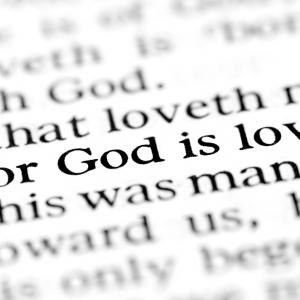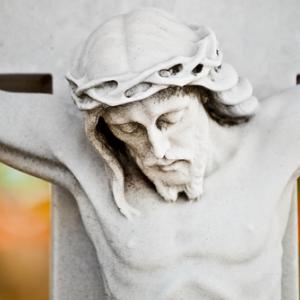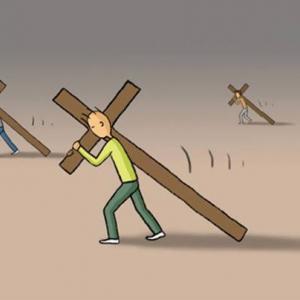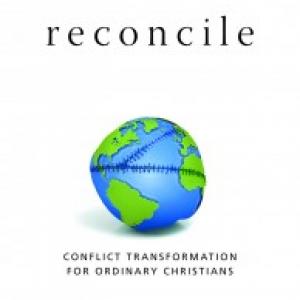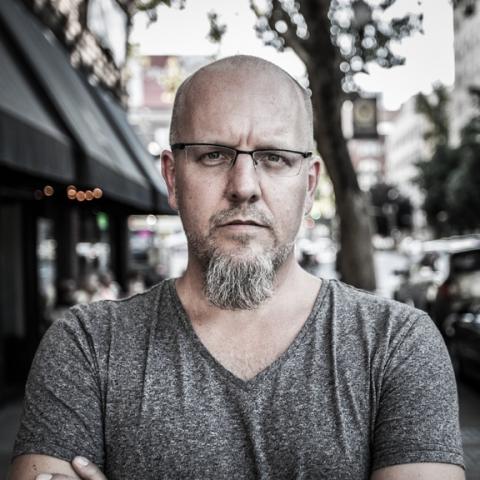
Christian Piatt is an author, blogger at Patheos and founder/cohost of the Homebrewed CultureCast podcast, where he focuses on the intersection of faith and popular culture. His latest book, “Leaving A-holiness Behind,” is available now, and his next book, “Surviving the Bible: A Devotional for the Church Year 2018,” will be available November 1, 2017.
Posts By This Author
Five Reasons Saying 'The Bible Clearly States' Is Dangerous
Most of my life, I’ve heard people preface some sort of argument they want to support with the preface, “The Bible clearly states…”
I’ve come to believe, however, that this is a phrase Christians should eliminate from their vocabulary, for a number of reasons:
- There’s no such thing as un-interpreted scripture.
Legendary preacher and theologian Fred Craddock famously noted that, even if one believes the Bible is inerrant, perfect, or directly handed to humanity from God, there’s still no way to glean an absolute understanding from the texts. After all, we all are imperfect, and as such all that we perceive flows through this imperfect vessel. The good news is that the Bible is full of imperfect vessels still being used for incredible good. So maybe rather than on absolutes, we’re meant to focus more on growth, improvement, and restoration.
- We can use the Bible to make nearly any claim we want.
Did you know “the Bible says” that if my man-jewels are squished irreparably for any reason, I’m barred from heaven (No one whose testicles are crushed or whose male organ is cut off shall enter the assembly of the Lord. Deuteronomy 23:1)? And have you considered that the Bible condones mass killing, or what some might consider genocide (Make ready to slaughter his sons for the guilt of their fathers; Lest they rise and posses the earth, and fill the breadth of the world with tyrants. Isaiah 14:21), or even infanticide (Isaiah 13:15-18)? I can use the Bible to justify slavery (wouldn’t be the first time), keeping a sexual concubine, or to prove why eating shrimp condemns me to hell.
- I’ve never met ANYONE in my life who follows the Bible completely from beginning to end.
I could swear the protesters from Westboro Baptist wear shirts that are a poly-cotton blend, and that some of the fiercest Bible-thumpers out there enjoy a good shrimp cocktail from time to time.
Repenting Doesn’t Mean Feeling Like Crap About Yourself
We’ve all heard the sidewalk preachers and TV Evangelists quoting the Gospels, telling us, "Repent, for the Kingdom of God is at hand!"
It’s a claim that is generally intended to strike fear and trembling in the hearts of many. We’re supposed to straighten up, do right, and atone for all of our heinous, sinful ways.
If you went to my kind of church growing up, there wasn’t a sermon that went by that you didn’t hear the pastor say something like, "The end could be today, tomorrow or next week. So you’d better beg for forgiveness, get right with the Lord, or risk getting ‘left behind.’"
The season of Lent is a time of reflection and repentance, yes. But we’ve come to misunderstand both what it means to repent, and what Jesus is talking about when he foretells of God’s coming Kingdom.
As for the latter, Jesus preached to some degree about the afterlife, yes. But his Kingdom-talk primarily was focused on us, on receiving and co-creating God’s Kingdom vision for ALL of us, here and now, in our very midst. So rather than talking about some hellfire apocalyptic end-times, he’s urging us to open our eyes, to see what’s right in front of us.
We can have what he, what God, long for us. To live in a world inspired and living into the Kingdom possibilities just there, nearly within our reach if we’ll only claim it and risk everything to fulfill it.
The Gospel of Mark: Manifesto of Political and Religious Defiance
I’m starting to think that Che Guevara and the Jesus of the Gospel according to Mark have an awful lot in common.
I should explain, first, that I’m in the first month of My Jesus Project, a year-long effort to more deeply live into the life, teaching and example of Jesus through prayer, study, and action. Each month, I explore a new dimension of Jesus with a mentor. This month is 'Jesus the Radical' with Christian Anarchist Mark Van Steenwyk. So of course coming from this point of view is going to impact my month's reading of the Gospel according to Mark. It's supposed to.
But in my 43 years of being exposed to the Bible, never have I seen the Jesus of Mark in the way I’m starting to see him now.
There are two recurring themes throughout the first several chapters in Mark: crowds and healing. The crowds following Jesus represent his growing power and influence — a growing threat to the occupying authorities of the Roman Republic — and though there are many general accounts of healing, the ones explicitly detailed in Mark all point to some act of political or religious defiance in the midst of the miraculous act of compassionate healing.
He’s either claiming the authority to forgive sins in front of religious leaders, healing on the sabbath, coming in contact with “unclean” women (like the bleeding woman in chapter five) without undergoing a cleansing mikvah ritual immediately afterward, or he’s touching dead bodies (also chapter five) without cleansing himself as well. So far, throughout the first half of Mark, every account of healing or forgiveness stands in direct defiance of some political or religious rule.
All human laws bow at the feet of the authority of God, which is not a rule of law, but rather a subversive, paradigm-shifting “from the bottom up” rule of love and compassion for others, first and foremost. Period.
Day Two of Following Jesus: Are We Done Yet?
First, the good news: After four months of preparation, I have officially started my year-long quest to more seriously understand what it means to follow Jesus — AKA “My Jesus Project.”
And now the bad news: After today, I still have 363 days left of this. Turns out, Jesus stuff is hard.
It’s not even that I’ve done anything that’s hard, in particular. I mean, the 30-day fast from solid food isn’t until next month, and I still have time to figure out how I’m ever going to feed 5,000. I haven’t even been crucified or put in jail or anything. So far, my main tasks have been to set up my prayer shrine for my daily meditations, to study one of the gospels daily, and to be particularly mindful of my own body and of the humanity of others I come into contact with.
But just that is hard work.
Yesterday was day one, beginning my first month in which I’m exploring “Jesus the Radical,” with Christian Anarchist Mark Van Steenwyk as my mentor. He’s started off easy on me, recommending the mindfulness exercise, and to take more public transportation. Hey, one out of two ain’t bad; I’ve got 26 days left in the month to work on the public transport thing. But though I got my prayers and gospel study done, and I was successful in getting my kids to school without yelling at them even once … or at least no more than twice. But in addition to taking my car everywhere so far, I’m behind in my pledge to walk 1,000 miles in a year. Although that only works out to about 3 miles a day, I’m already just under four miles for two days.
Oh, and Mark has warned me that he has some much more challenging things in mind for me this month, and that he was just breaking me in, getting me used to the shallow end before tossing me in for the sharks, complete with chum underwear.
Charlie Hebdo: Comedy As an Act of Courage
I love Jon Stewart. I mean, like “maybe jump the fence” love him. His presence on The Daily Show has spoken to and with my generation through some of our most formative years.
And yes, he tells fart jokes (which I also love). And yes, he editorializes, (which is nearly ubiquitous in “legitimate news” streams anyway). But he also often names what people are thinking, feeling, or what they can’t even put into words.
And then he helps us laugh about it, and at ourselves.
On a recent episode of The Daily Show, however, he took a more sober tone when talking about the slaughter in the headquarters of the French satire magazine, Charlie Hebdo. One comment in particular that he made stuck with me, not because it was funny or witty. Rather, it pointed to something we all need to consider more seriously, I think.
Why Christians Should Support the 'Satanic' Statue in Oklahoma
Oklahoma may seem an unlikely place for what has been called a satanic sculpture to be installed on government property. In fact, there may be no better place for it.
Considered by many to be the buckle in the proverbial Bible Belt, the statehouse in Oklahoma City has boasted a sculpture of the Ten Commandments, paid for by Oklahoma State Representative Mike Ritze, for some time. Actually, the statue is in the process of being rebuilt after a man who heard voices in his head urinated on the monument and then crashed into it with his car.
Perhaps most interesting is the legal groundwork laid to allow such a religious statue to be placed on public property. To avoid church/state separation issues, the property on which the statue was placed was declared as a monument park, and Ritze donated the piece. Finally, Ritze claimed protection under the First Amendment as a basis for a religious icon being on government grounds.
But they set legal precedent for other groups, like the Church of Satan, to do the same thing. They have actually agreed to halt plans for the installation if Ritze and his supporters will not replace the destroyed Ten Commandments statue. At this point, Ritze intends to proceed, while also fighting the placement of the other piece.
There are at least three important factors to consider including:
1) The First Amendment applies to thing we don’t like.
5 Ways I'm the Worst at Following Jesus
My biggest concern at the moment is that though a lot of us claim to “be Christians,” or even to follow Jesus, a lot of us don’t spend much intentional time trying to figure out what that means and what it looks like in daily life. We try not to be too crappy to other people, try not to kill, steal, adulterate (is that even a word?) or worship graven images. We try to love, and to accept love — though we still hurt each other. A lot. The world is messed up and so far from realizing the fully kingdom-inspired image of wholeness and reconciliation to which God invites us.
And at least in my theological world, that’s on us, not God. I believe, with all of my being, that the audacious vision of God’s kingdom, here and now, isn’t something we sit around and pray for God to make real for us. Like Jesus said, we can (and should) collectively do greater things than even he did. When people experienced healing in his presence, he never said, “Hey, I did that!” Rather, he always told them that it was their own faith that made them well.
That’s pretty amazing to consider. And inspiring. And terrifying.
So here I am, not so much trying to be Jesus, but trying to at least follow his life, teaching, and example better. And in taking my own personal inventory, I can see that I pretty much suck at it. That doesn’t mean I’m giving up, but it’s clear I have plenty of work to do. Here are five examples
Jesus Can't Breathe
My friend Peter Heltzel, along with a cohort of some 75 faith leaders in New York, have called the lack of police accountability in New York and elsewhere “a spiritual problem.” They’re right, and it’s a problem that requires a spiritual response.
But beyond all of this, there is a greater spiritual sickness I see — one that is not being discussed nearly enough. It reaches both to the deeply individual level and to a global scale. It is the question that Dr. King asked, and ultimately died for — as well as others, past and future. It was a principle for which Jesus was willing to die as well. And yet the wound festers.
Violence, or the threat of violence, is real. And the human response of fear to such a threat is a normal, socially-accepted response. It is a deeply rooted instinct, honed by human evolution over millennia, to defend ourselves against a perceived threat. However, if we want the systems around us to change, we have to consider that the fear-and-violence response has failed us, time and again. Despite using it, we still have both fear and violence. And those with power exploit those fears to further personal agendas and to manipulate others.
We hold out hope that changing leadership at local, state, and federal levels ultimately will save us from ourselves. But as Walter Wink wisely said, "If you want systems to really change, you can’t just change the rulers; you have to change the rules entirely."
Considering 12 Sides of Jesus
Not surprising, this whole endeavor to understand what it really means to follow Jesus in today’s world is proving to be nothing short of overwhelming. Though I’d like to start my year-long effort to live this out on New Year’s Day, I’m not entirely sure I can get my hands around this Jesus we’re talking about by then. I mean, I grew up reading Scripture, have written several books about Jesus and the Bible, but somehow I’m always left with a sense that there’s more — a lot more — about Jesus and about being a follower than we generally consider.
As part of my effort to approach the year, I’ve decided to break down various dimensions of Jesus, based both on my own reading of the Gospels (and Epistles to a lesser degree), as well as the interpretations of scholars, theologians and activists I respect. So for now, I’ve broken this down into twelve categories, so that I can focus on one per month as intently as possible. This doesn’t mean that there aren’t some other things I’ll decide to do all year long (like pray the Lord’s Prayer), or some things I’ll try once that may or may not fit within that month’s “Jesus dimension.” But when I consider the following twelve ways of looking at Jesus, it feels like a pretty comprehensive approach.
I’m also assembling a group of mentors to help me with each of the respective Jesus Dimensions below. I figure that, rather than having a dozen disciples, I could use mentors way more than followers if I have any hope of making this work.
But I’m interested in what you think. Am I missing something? Do any of these simply not ring true at all?
I'm Following Jesus…For Real This Time
Being a Christian, by definition, means we endeavor to follow Jesus. But few if any of us does it, really. I mean all the way. As Shane Claiborne famously once said, Jesus ruined his life. Once he went all in on what he felt God was calling him to do, everything in his life — all he held dear and felt was important — got turned upside down.
It happened all the time in the gospels. The second someone decided to follow Jesus, BAM! Life as they knew it was over.
Who wants that? Who of us is really so invested in this idea of following Jesus that we’d set it all down and walk away if we had to? I don’t know about you, but the very idea of it is pretty terrifying.
So I’m going to try and do it. With some ground rules, like I’m not going to abandon my family. But over the next 16-18 months, I want to be lot more intentional about what it means to follow Jesus. For real.
What Have the Romans Ever Done for Us?
Last week I spent a few days in Rome with, among others, Tony Jones. As someone who hasn’t ever been to Rome, it was particularly helpful for me to have a Christian historian along. It’s easy enough, having seen one amazing display of ruins after another, or cathedral after awesome cathedral, to lose some perspective. So along the way, Tony would stop and point out the historic significance of various landmarks. Then of course, we’d go grab a bourbon and talk.
Both of us, at one point or another in the week, thought of the Monty Python scene from Life of Brian, in which the disgruntled rebels exclaim, “What have the Romans ever done for us?” So of course, some wise guy in the group starts rattling things off, like the aqueducts, roads, education, and so on.
So this led to a minor debate between Tony and me about the benefits of empire. Now, keep in mind that Tony is never one to pass up an opportunity to serve as the antagonist, but his argument as outlined in his blog post cheekily titled “In Praise of Empires,” is that it’s en vogue to trash empire, both present and past.
To put a finer point on it, we chatted about whether Constantine, the Roman emperor responsible for establishing the Nicene Creed, was an ass-hat.
Disquiet Time: How Revelation Ruined (and Saved) My Life
I was asked to contribute a chapter to a new book called Disquiet Time: Rants and Reflections on the Good Book by the Skeptical, the Faithful, and a Few Scoundrels. The volume, an edited compilation put together by Cathleen Falsani and Jennifer Grant, takes on many of the weird texts in scripture that we either gloss over or completely ignore because they’re just too … well, weird.
Of course there are plenty of spiritual oddballs to choose from, but as soon as I got the invite, I knew I wanted to write about the book of Revelation (note that there is not “S” at the end; there is no such book as Revelationsssssssss in the Bible). Suffice it to say that my relationship with the last book in the bible is a little bit complicated. In fact, it ruined my potential career as a lifetime Baptist. A number of you may have heard bits or pieces of the story about how I got kicked out of church as a teenager, but may not know all the details.
Well kids, you can blame it all on one freaky Bible book, one intransigent teenager and a floppy-Bible-wielding youth minister. But although the experience pushed me out of church for a solid decade, it didn’t forever ruin my search for the divine. But this particular story isn’t about that. It’s about how I got one particular youth minister so red-faced and flustered that he cussed me out and almost hit me square in the noggin with the Good Book.
No Left Turns: How We Normalize Dysfunction
“All truth passes through three stages. First, it is ridiculed. Second, it is violently opposed. Third, it is accepted as being self-evident.” —Arthur Schopenhauer
I’m visiting Las Vegas this weekend, one of several stops on my postChristian book tour. I’m staying with my aunt and uncle, who are also in ministry, and who I don’t get to spend time with nearly often enough.
My aunt JoLynn was reading aloud a story about the shipping company UPS and how their trucks don’t make left turns. Of course my first reaction was, “well, that’s stupid.” It seems entirely counterintuitive to send trucks on a roundabout circuit when they could much more easily cut the route short by hanging a left. You need to go right, turn right. Need to go left, turn left for crying out loud. It’s just common sense, right?
Maybe not.
UPS has a proprietary navigation system that helps drivers plot out all of their stops in a day and the most efficient way to get there. And based on their research, left turns result in more wasted time and more accidents than they’re worth. Drivers end up stuck at long lights when they could otherwise be turning through a red light making a right turn and making another drop-off. Plus, without left turns, trucks don’t have to cross oncoming traffic, which means fewer collisions.
They save time. They save money. All it took was thinking differently about how the delivery routers should be configured without all of those high risk, time-consuming left turns.
What Christianity Can Learn from the Dalai Lama
Historically, Christianity hasn’t been very open to the idea of being influenced by other religions. In the early days of the faith, we borrowed from Hellenism, Zoroastrianism, Gnosticism, Judaism and various “pagan” religions, repurposing their symbols to mean something new. Following the adoption of Christianity as the official religion of the Roman Empire, we focused more on converting others to our faith, or at least denigrating the legitimacy of other faiths to establish ours as superior.
Oh, but times, they are a’changin.’
Our numbers are down, our influence continues to wane, and we’re struggling with what I call in “postChristian” both an identity crisis and a credibility crisis. The good news is that, in this newly humbled state, lies a glimmer of opportunity. Not the kind we’ve had previously, to once again dominate the cultural landscape. That time has passed. Rather, as more of us within the Christian faith take less for granted, we’re asking harder questions:
'Reconcile:' Interview with Peace Activist John Paul Lederach
I’ve had the chance to speak with author and international peace activist John Paul Lederach about his book, Reconcile: Conflict Transformation for Ordinary Christians. The book, updated from an earlier edition with a new introduction from Bill and Lynne Hybels and additional stories, is a powerful guide on how to seek and realize peace among us on both local and global scales.
Having traveled the world brokering peace agreements between governments and rebel groups, and having risked his own lives and that of his family for the sake of reconciliation, Lederach speaks prophetically to difficult issues facing us today in a way that few can.
From Gaza to Iraq and even Ferguson, Mo., we want to know: what do we do now? Thankfully John Paul Lederach offers us both the hope and the tools to begin achieving reconciliation, wherever we are. In our discussion below we talk about his book, which is capturing the attention and imaginations of leaders everywhere.
Michael Brown, Iraq, Putin, Gaza: How to Reconcile the Brokenness?
A soon-to-be college-bound Michael Brown is shot by Missouri police, reportedly while holding his hands above himself in surrender and while unarmed. The resulting protests turn violent, leading ultimately to police setting up barricades, complete with snipers, tear gas, and flash grenades. Local stores are decimated and scores are injured in the resulting tensions.
Not long ago, Eric Garner, another African-American man, died of suffocation while being submitted to a choke submission hold by a New York policeman.
Last year in North Carolina, a black man was shot 10 times by a policeman. And all of this is in the shadow the Trayvon Martin, whose tragic and unnecessary death, is still fresh in our minds and hearts.
As cited on the Economist website , it’s enough to elicit a grim question from Delores Jones-Brown, director of the John Jay College on Race, Crime and Justice. “People are asking,” she says, “Is it open season on us?”
Meanwhile, half a world away in Iraq, ISIS continues to wreak havoc, and the United States has resumed an airstrike campaign after a decade of military force trying to maintain a tentative peace in a fractured nation. Hardly a day goes by when we don’t have reports of more Israeli and Palestinian blood spilled over the historic Gaza conflict, and Russian President Vladimir Putin continues to — in the words of a recent TIME Magazine article — “create problems only he can solve.” All the while, he stokes resentments between east and west not seen since the Cold War, seeking, too, to weaken the cohesive strength of NATO and to drive a wedge between the United States and its allies in Europe.
What’s happening to us?
Five Reasons post-Christianity Is Good for Us
Anyone who has been paying attention knows that Christianity is in decline in the western world by all accounts. From progressive mainline churches to evangelical mega-churches, most institutional religious bodies are experiencing precipitous drops in attendance and giving. Meanwhile, the Christian voice in the civil and political conversations is also giving way to other perspectives, be they Jewish, Muslim, or secular humanist. It’s no longer a dark mark on one’s social character to say they don’t go to church, or even that they’re not a Christian.
For many leaders within organized Christian circles, this is all a call to arms, a warning shot across the proverbial bow to wake us up from our slumber and engage the impinging culture war with renewed commitment.
But as I suggest in my new book, postChristian: What’s Left? Can we fix it? Do we care? It’s actually good news. Granted, it may not slow the decline and closure of churches anytime soon, and we Christians will likely continue to lose some degree of political clout, but I argue that this isn’t the point. It never was. And in fact, our numerical, political and even financial success in recent generations has taken us far off track.
God Isn't Punishing Mark Driscoll
This week has been a rough one for Mark Driscoll, pastor of Mars Hill Church in Seattle. Following one scandal after another, the Acts 29 Network – which he helped found – removed his standing and his church’s standing within the network. They also encouraged him to step down as the leader of Mars Hill.
To add to that, Lifeway Bookstores, which is one of the biggest faith-based book chains around, decided to stop carrying all of Driscoll’s books. Basically this just means he can join me and all of us progressive Christian authors who have been edged out by Lifeway. You’ll get used to it, Mark.
All of this is good for Christianity as a whole. For starters, it demonstrates the autonomy of the Acts 29 Network from their founder. And despite their many misguided policies regarding women and their proclivity for hyper-calvinism overall, it shows that they, too, have their limits.
As for Lifeway, I can’t really tell if their decision to drop Driscoll is an ethical one, or a matter of mitigating further PR risk by having his titles in their stores. Either way, props for getting his face off the shelves, regardless.
I’d not be surprised, too, if Driscoll chooses to step down from Mars Hill in the near future. At some point, even he will recognize his leadership as untenable.
In the midst of all of this, I’m conflicted.
Five Reasons Progressive Christians Secretly Love Mark Driscoll
Anyone who reads my stuff with some regularity probably already knows that Mars Hill pastor Mark Driscoll isn’t exactly on my speed dial list, and I’m probably not in his. From his misogynistic quips to his hellfire hyper-Calvinist rants, he and I see almost all social and theological issues as differently as two people could and still call themselves Christians.
Add to that the recent plagiarism scandal, compounded by the fact that he effectively bought his way onto the New York Times bestseller list (and it turns out he may have used church money to do it), and I question the man’s fitness for ministry.
Having said that, I actually kind of love the guy—and you do too, if you’re being honest. No, I don’t mean in the “I love him because Jesus said I have to” kind of way. I mean you really kind of have a thing for him. Here’s why.
How Would Jesus Vote?
We’d all love to claim Jesus for our team, but in doing so, we can safely assume that Jesus actually would wriggle free from such limitations. While it would be comforting to validate ourselves by claiming Jesus as a Baptist, Disciple, Catholic, or something else, what we’re effectively trying to do is keep from changing ourselves. We want to rest in the certainty that we’re all right how we already are, with no real need to grow or do things differently.
